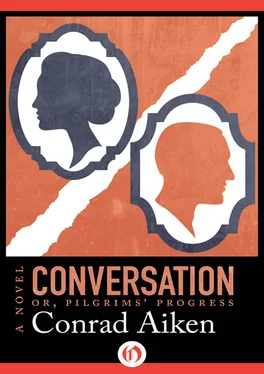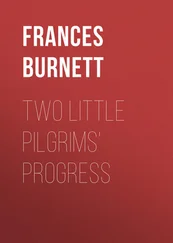But where, exactly, did a picture come from?
BAKER STREET: TOWN LANDING.
He turned down the wet lane, his slicker rustling, the oilskin hat in his hand. The tall house, with its weathered shingles and heavy stone porch, stood gray and forbidding against the leaden river, the porch was deserted, save for a single rocking chair, bright red, tilted against the wall — not a soul, not a sound. He stood listening at the foot of the steps for a minute, heard inside the house a rising murmur of voices, then walked softly down to the water’s edge and Paul’s canoe. The ribbed floor of it, usually spick and span in its bright varnish, was extraordinarily muddy — something very peculiar must have happened to it — certainly not Paul’s doing. A sodden cushion, too, which they had neglected to take in. How disgustingly typical. It reminded him, for no reason, of old Pop Amos and his newly painted boat, beside which he had sat all summer on the shore, in a kitchen chair, reluctant to put fresh work to use — horrified at the thought of that exquisite sheen exposed to the ravages of salt water and mud. Not like this! He pushed the canoe before him down into the rain-pricked water, took the wet paddle from beneath the rear thwart, stepped in and shoved off. The tide was coming in, nearly full, he could drift up to the bridge, and then paddle back. Time to think.
Yes, I heard you , she had said, yes, I heard you . And with what a voice, too — that stifled and averted voice, pity-demanding. Yes, by god, now that she was going to have her way, she wanted to be pitied, too — was that it? Well, let her look for it. Let her go and look for it!
But where did a picture come from?
From a dream perhaps: from the bloodstream perhaps: from memory perhaps: an observed trifle which touched down quickly and magically into the unconscious, like the rain-ringed water, the rain-seethed water, round the drifting canoe — its varnished yellow stem, like the stem of a gondola, nodding and notching against the deserted hulks of the fishing boats on the opposite shore, against the sand bar, against the granite pier of the two-spanned bridge. That curved stem, brightly swaying in the gray light, and beyond it the red iron girders of the bridge — to what did they not invite, to what did they not lead? To the bright open hand of childhood, the rain-filled eye of childhood — or tear-filled? A nucleus smaller and brighter than a tear; and how astonishingly more fecund and powerful — the infinitesimal droplet of wild rain, wild water, growing, whirling, expanding, until it should become an all-containing sphere of creative and whirling light, a microcosm of living shape! Yes, a feeling , first — more tenuous than shadow, tenderer and more elusive than light — less substanital far than tentacle or palpacle — softer than an ache, vaguer than a longing — the seed of a design that should be, or become, oneself, as if one’s heart were to begin all over again, from the very beginning of the world, and seek for itself a better and stranger, but at the same time more intimate shape, a shape deeply truer to oneself — was it something like that? And one’s love too, was that not there also? Must it not be there? As of the first leaf that one ever loved, the first sunbeam one ever saw on a wall, or on the coarse bark of a tree, the first rain that one ever walked out into alone. And the terrifying maternal dark, which filled so much of the world — that echoless or almost echoless dark, fathomless, tunneling everywhere, even through sunlight, tunneling between hour and hour, between one minute and the next, so that at last nothing at all seemed to remain solid, not even oneself: yes, it came out of this, or went into it, or both — the first leaf was seen against that dark, separate from it, and it was to the brilliant and beloved, and so isolated first leaf, that one attempted to return. It was a celebration, at one and the same time, of love and terror.
The piled granite blocks of the central pier were right before him, rough, whitely barnacled, the swift and silent current had borne him close, he could see through the deep clear water, green-wavering, the red fronds of sponge that grew at their base, combed by the tide. He remembered Buzzer’s extraordinary discovery, by the sea wall at the foot of the garden, that the barnacles were feeding, combing the tide with quick minute thread-like filaments, licking in their tiny morsels of sea food — he must turn back. He dipped the wet paddle, the flat blade cleaving the water with a powerful swirling chuckle, a slow skirling eddy of vortical sound, swung the canoe round and shorewards, careening, out of the main current and into the shallows. The Indian stroke, the hands turning inward and downward, so that the bow was driven straight — good lord, how long ago he had learned that, on the Assabet River! Now he could look up from the river to his own sea wall, and beyond this the terrace wall, the new lilacs, the white woodshed, the dormered windows of the cottage itself. The little wet garden was deserted. Not even Chattachoochee. Buzzer was still lying down, singing to herself over her shells. And, of course, Enid—
A car rattled quickly over the bridge behind him, going down the Cape; in the silence that followed he could hear again the faint whisper, the delicately needled seethe, of the fine drizzle on the water. Thunder, for the third time — Ratio Binney’s chuckle of thunder — ran somewhere behind the sullen clouds in the southwest, to which he lifted his eyes, but there was no lightning. It might rain all night, but there would be no “tempest.” The bare boughs of the silver-leaf poplars, above the low roofs of the village, were yellow, yellow-green, lizard-green — something might be done with them. They suggested something, reminded him of something — something urgent and lightninglike, but slow and cancerous, too. Was this the first leaf again? The first hand seen in the dark? The first grasp, first clutch, in the maternal nothing? Hands against the sky, claws against the sky.…
Karl Roth was standing on the fringe of beach, waiting there by the stone arches under the verandah, a dirty raincoat flung capelike over his round shoulders, the white face already sneering, the queer yellow head bare to the drizzle. He stood silent, disapproving, as the canoe rustled up past him on the sand, driven by the last powerful stroke, then said:
“Well, if it isn’t our Mr. Kane. And just when we thought he’d ratted on us.”
“Meaning what?”
“Oh, nothing. Nothing, gat -all, Mr. Kane! I just like to sneer.”
“Yeah? Well, you’d better save up your sneers, Karl, till you’ve got something to sneer at. You’ll have plenty. Is Jim inside?”
“Yes, sir, just when we thought he’d weaseled on us! Sure Jim’s inside. Where else would he be? It’s old home week, didn’t you know? And we’re having a housewarming.”
“I hope that means those gals of yours have got you a meal.”
“A meal! Don’t make me laugh. If you want to see something funny take a gander at our kitchen. Just take a peek when nobody’s looking. I’m not squeamish, but—! No, the girls have gone on strike. We’re having a stinko of a row. You’re just in time to give us a hand. Come on in, the water’s fine.”
Kitty’s voice, wailing, had just risen to a shrill “No!” as they opened the door. She faced them with open red mouth from the dinner table in the middle of the big room, where she was sitting — her black hair was disordered, the small dark eyes swollen as with weeping, she looked pale and distraught, harrowed. The sound of a piano came briskly through the open door from the room beyond, the verandah room — Lorna, no doubt, ploughing through a Chopin Etude — and Jim, obviously very tired, sat in a rocking chair by the littered fireplace. The cap was pulled morosely down over the brown eyes, he was smoking a cigar. He waved the cigar, without getting up, and said wearily:
Читать дальше












